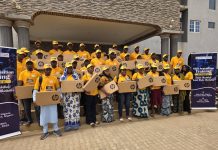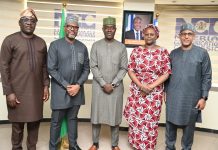The Nigerian Communication Commission (NCC) the regulator of telecommunication sector, a sector that has seen growth over the years and contributed immensely to the economy of the country, presently, under the leadership of Prof. Danbatta has overtime demonstrated that not only telecoms ecosystem that their strides are seen they have made positive impact in other sectors through capacity building and intervention. As it stands now, the NCC have the academic system in view. The Commission recently made this intention known when they made a Request for Proposals for Telecommunications Based Research from Academics in Nigerian Tertiary Institutions.
Capacity building is one of the things that drive the telecoms sectors and ability to localize research in the country matters. This knowhow will help the industry stakeholders, players and regulator to take informed decision as it regards to telecommunication space and information and technology (IT) ecosystem. The NCC is taken the bull by the horn when they made Nigerian tertiary institutions to submit proposals on the strides, adaptation and impact the telecommunication space is making in the lives of Nigerians and the economy.

Headed by a seasoned man from the academic space, Prof. Danbatta has shown that the Commission has confidence in the Nigerian education sectors unlike some other MDAs or government bureau that would contract such an important assignment to either private sector players or international body. This singular move that the EVC (Prof Danbatta) made has been described as a welcomed development by the stakeholders in the educational space, now that Nigerian academics are emigrating to other countries where they will be well renumerated.
The Commission stated that the proposal would include” The Telecommunications-based research Innovations from the Academics in the Nigerian Tetiary Institutions programme is designed to achieve the following: Feasible Research ideas, capable of replacing or enhancing foreign technologies in the telecommunications ecosystem in Nigeria i.e development of indigenous content in sector factor. Support development of capacity in the tertiary institutions (researching on emerging technologies) and promote Nigeria’s contribution to the pool of technologies in use in the Communications industry.”
The commission added that “Viable prototypes commercialization should result in spin-off companies, creating wealth for the tertiary institutions and job opportunities for the students that worked on the projects. The programme is part of the Nigerian Communications Commission’s agenda for enhancing indigenous content and ensuring “industry-ready” graduates for sustainable development of the Nigerian telecommunications industry. The published research proposal outline included sections on Evidence of Local Content Realization up to Prototype Stage and, Relevance to the Telecom and related Industry. The Research Grant is awarded to the Tertiary Institutions and therefore paid into the Tertiary Institution’s nominated account. The institution will disburse the Grant to the Lead Researcher of each team.”
The Nigerian Communication Commission would be giving grants to the research teams, this would enable them to do a thorough job and make their presentation when approved by the Commission. The published research proposal outline included sections on Evidence of Local Content Realization up to Prototype Stage and, Relevance to the Telecom and related Industry.
Anthony Nwosu
” The Telecommunications-based research Innovations from the Academics in the Nigerian Tetiary Institutions programme is designed to achieve the following: Feasible Research ideas, capable of replacing or enhancing foreign technologies in the telecommunications ecosystem in Nigeria i.e development of indigenous content in sector factor. Support development of capacity in the tertiary institutions (researching on emerging technologies) and promote Nigeria’s contribution to the pool of technologies in use in the Communications industry.”








